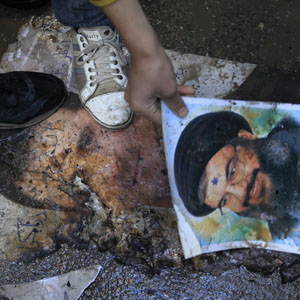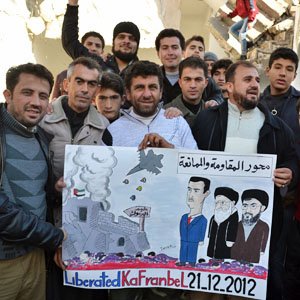
Late last month, Israeli military planes carried out a strike on the outskirts of Damascus, targeting a convoy transporting anti-aircraft weapons bound for Hezbollah. The strike was the latest indication that Lebanon’s Party of God is not only directly involved in the violence in Syria, but will leverage the chaos there to bolster its arsenal, sparking a chain reaction that will further destabilize Syria. Hezbollah, it appears, is indeed the party of “resistance:” resistance to real democracy in both Syria and Lebanon.
Four days after the attack, Israeli Defense Minister Ehud Barak told the Munich Security Conference that the raid was “another proof that when we say something we mean it.” Since the beginning of the conflict, Israel has stated its commitment to keeping advanced weapons systems out of Hezbollah’s reach. Damascus and Tehran have both vaguely threatened to retaliate, further stoking fears that Syria’s conflict will continue to spill over into neighboring countries. Within a day of Israel’s raid, the White House warned the Assad government that “Syria should not further destabilize the region by transferring weaponry to Hezbollah.”
 The Syrian government, along with longtime allies Iran and Hezbollah, condemned the Israeli airstrike. Hezbollah expressed “full solidarity with Syria’s command, army and people,” calling the raid part of the conspiracy “that aims to destroy Syria, its army and vital role in the line of resistance.” President Bashar al-Assad accused Israel of seeking to “destabilize and weaken Syria,” according to SANA, the state-run news agency. It is Assad’s ally Hezbollah, however, which has proven to be one of the most destabilizing forces in the war-torn country.
The Syrian government, along with longtime allies Iran and Hezbollah, condemned the Israeli airstrike. Hezbollah expressed “full solidarity with Syria’s command, army and people,” calling the raid part of the conspiracy “that aims to destroy Syria, its army and vital role in the line of resistance.” President Bashar al-Assad accused Israel of seeking to “destabilize and weaken Syria,” according to SANA, the state-run news agency. It is Assad’s ally Hezbollah, however, which has proven to be one of the most destabilizing forces in the war-torn country.
As Syria’s uprising nears its two-year mark, the regime is increasingly relying on help from Hezbollah to suppress rebel forces and civilian populations. Syrian rebels have long accused Hezbollah of providing assistance and sending fighters to support regime forces. By June 2011, Syrian protestors were protesting not only for the downfall of Assad, but also against Hezbollah. Indeed, it is the group’s activities in Syria that have, as a journalist in Lebanon put it, “torn away the party’s mask of virtue.”
“Today, Hezbollah is more vested in the defense of the Assad regime than ever before. The Party of God has turned its ‘weapons of resistance’ not on Israel, but on fellow Muslims.” – Matthew Levitt, The Washington Institute
Within weeks of the uprising, Hezbollah leader Hassan Nasrallah himself called on all Syrians to stand by the regime. Yet Hezbollah denied playing “any military role in Arab countries.” According to a senior Syrian defense official who defected from the regime, Syrian security services were unable to handle the uprising on their own. “They didn’t have decent snipers or equipment,” he explained. “They needed qualified snipers from Hezbollah and Iran.”

Syrian protesters step on posters of Syrian President Bashar al-Assad and Hezbollah leader Hassan Nasrallah during an anti-Assad rally in Saqba, Syria, January 27, 2012. (Reuters)
In August 2012, the U.S. Treasury Department again blacklisted Hezbollah for providing “training, advice and extensive logistical support to the Government of Syria’s increasingly ruthless efforts” against the opposition. A month later, the U.S. government further exposed Hezbollah’s activities in Syria when the Treasury Department sanctioned Hezbollah chief Nasrallah and two key leaders, Mustafa Badr al-Din and Talal Hamiyah, for actively supporting the Assad regime. Syria has been a longstanding supporter of Hezbollah, providing safe haven and acting as a weapons conduit for the group. Under Nasrallah’s leadership, according to the U.S. Treasury, Hezbollah “is now returning the favor by providing training, advice, and extensive logistical support” to aid the regime’s violent efforts against the opposition.
News of this began to leak, even from Hezbollah’s own sources. In early October 2012, a senior Hezbollah military commander, Ali Hussein Nassif, was killed in Syria, along with two bodyguards, “while performing his jihadi duties,” according to a Hezbollah newspaper. Hezbollah spokesman Ibrahim Moussawi confirmed the deaths of Nassif and other Hezbollah members, but the group continued to deny any involvement in the internal Syrian crisis. Months earlier, Hezbollah parliamentarians had reportedly attended the funeral of military commander Musa Ali Shehimi, who had also “died while performing his jihadi duty.”

Demonstrators hold a placard with caricatures of (L-R) Syria's President Bashar al-Assad, Iran's Supreme Leader Ayatollah Ali Khamenei and Hezbollah chief Hassan Nasrallah in Kafranbel (also Kafr Nabl) near Idlib, Syria, December 21, 2012. (Reuters)
As U.S. officials informed the U.N. Security Council in October 2012, “the truth is plain to see: Nasrallah’s fighters are now part of Assad’s killing machine.” Two months later, a U.N. report confirmed Hezbollah members were in Syria fighting on behalf of the Assad government. Hezbollah even set up training camps near Syrian chemical weapons depots in November 2012. According to one senior U.S. official, “The fear these weapons could fall into the wrong hands in our greatest concern.”
For a group that has always portrayed itself as standing up for the dispossessed in the face of injustice, downplaying its sectarian and pro-Iranian identities, supporting a brutal Alawite-dominated regime against the predominantly Sunni Syrian opposition risked shattering a long-cultivated image. In the end, the strategic necessity of preventing the collapse of the Assad regime – which, if replaced by a regime representing the country’s Sunni majority, would be far less friendly to Hezbollah and possibly outright opposed to it – took precedence over the need to maintain the party’s image.
Today, Hezbollah is more vested in the defense of the Assad regime than ever before. The Party of God has turned its “weapons of resistance” not on Israel, but on fellow Muslims. This, more so than the U.N. indictment of four of its members for the murder of former Prime Minister Rafiq Hariri, and more so than the exposure of Hezbollah operations in places like Azerbaijan, Cyprus, Bulgaria, Thailand, and Turkey, is what now threatens Hezbollah’s standing as a Lebanese political party and social movement. It will be up to the people of Lebanon, and of Syria, to respond accordingly, if they truly desire democracy.
This post was originally published on WashingtonInstitute.org. ©2013 The Washington Institute for Near East Policy. Reprinted with permission.
The views expressed in this Insight are the author’s own and are not endorsed by Middle East Voices or Voice of America. If you’d like to share your opinion on this post, you may use our democratic commenting system below. If you are a Middle East expert or analyst associated with an established academic institution, think tank or non-governmental organization, we invite you to contribute your perspectives on events and issues about or relevant to the region. Please email us through our Contact page with a short proposal for an Insight post or send us a link to an existing post already published on your institutional blog.
Matthew Levitt
Matthew Levitt is a senior fellow and director of the Stein Program on Counterterrorism and Intelligence at The Washington Institute for Near East Policy.